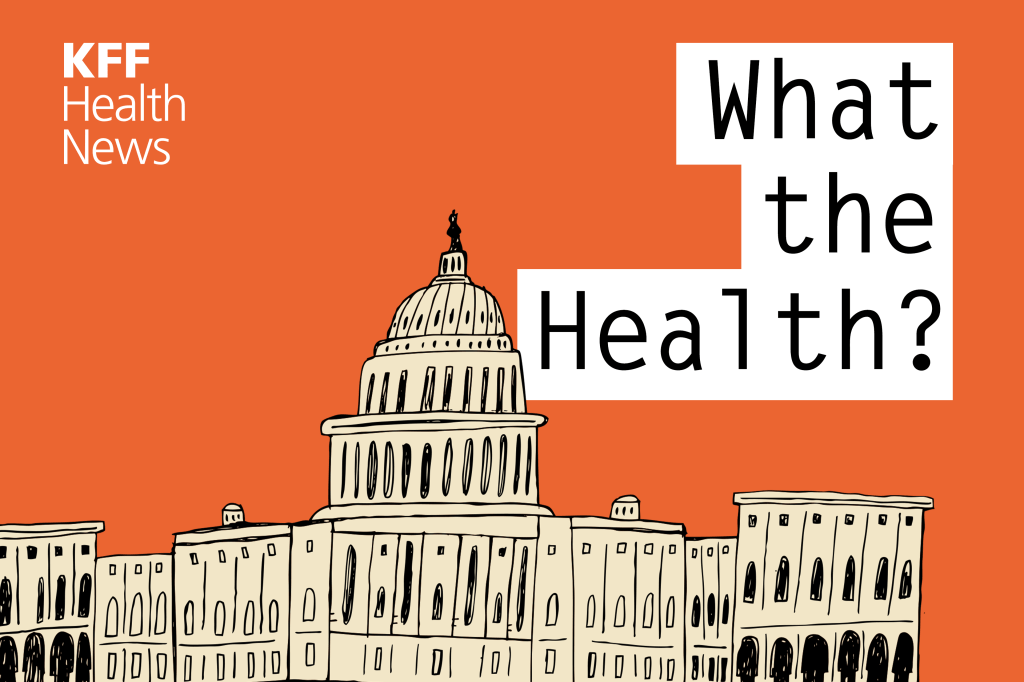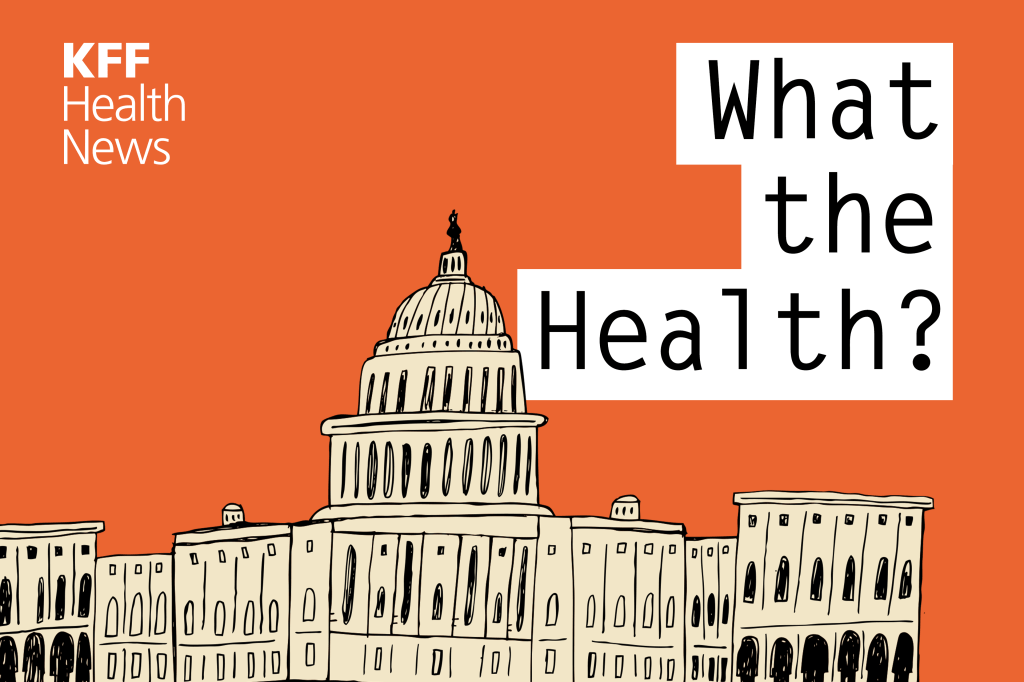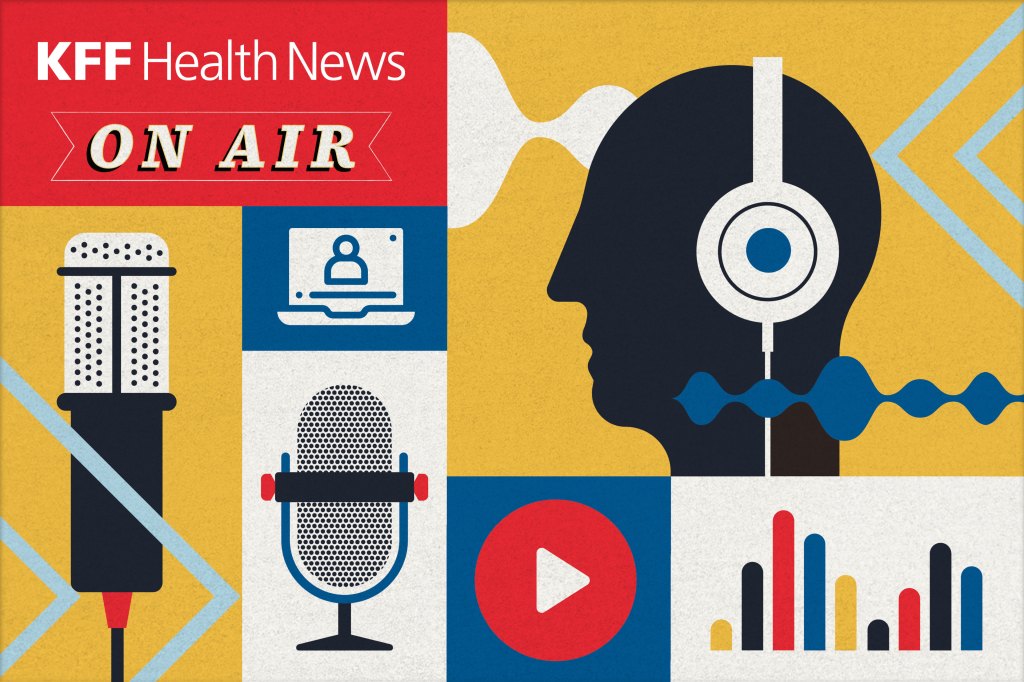KFF Health News’ ‘What the Health?’: Less Than Two Weeks To Go

Health News tamfitronics
[Editor’snote:[Editor’snote: This transcript was generated using both transcription software and a human’s light touch. It has been edited for style and clarity.]
Julie Rovner: Hello, and welcome back to “What the Health?” I’m Julie Rovner, chief Washington correspondent for KFF Health News, and I’m joined by some of the best and smartest health reporters in Washington. We’re taping this week on Thursday, Oct. 24, at 10 a.m. As always, news happens fast and things might have changed by the time you hear this, so here we go.
Today we are joined via video conference by Rachel Cohrs Zhang of Stat News.
Rachel Cohrs Zhang: Hi, everybody.
Rovner: Victoria Knight of Axios.
Victoria Knight: Hello, everyone.
Rovner: And Sarah Karlin-Smith of the Pink Sheet.
Sarah Karlin-Smith: Hi, everybody.
Rovner: Later in this episode we’ll have my interview with my friend and KFF colleague Tricia Neuman about Medicare open enrollment and what to expect in Medicare in the coming year.
But first, this week’s news. We will start on the campaign trail since Election Day is now less than two weeks away. Let that sink in. Abortion is, at least according to many polls, on the upswing as a voting issue and, probably not coincidentally, abortion-adjacent issues, like contraception, are also getting more attention. But while it’s clear that Democrats are still pretty much the party of abortion rights and Republicans are pretty much the party representing anti-abortion activists, we’re seeing some Republican candidates working pretty hard to muddy the waters. Yes?
Knight: Yeah, it’s been interesting this election cycle. We have seen some Republicans saying that they are pro-choice. And this is at a time when, finally, on the Democratic side in Congress, there really are not many anti-abortion Democrats left. We have in the House congressman Henry Cuellar [of Texas] is really the only one left. [Pennsylvania] Sen. Bob Casey, we’ve kind of seen him swing over time to be more in the camp of pro-choice, pro-abortion rights and so …
Rovner: … which was really, in Casey’s case, really interesting, because his father, who was the governor of Pennsylvania, was sort of the original anti-abortion Democrat back in the early 1990s.
Knight: Yeah. I’m interested to see if this works in — we’re seeing, particularly in some more moderate, swinging House seats, that Republicans are trying to message in this way that they’re more moderate on abortion, saying they’re more pro-choice. I’m interested to see if this actually works. And then we have perhaps this caucus within the House, if that works, that are more moderate. I mean, you already see in the current makeup of the House, there are some House Republicans, particularly the New York Republicans, that were really careful in this 118th Congress when they were having to vote on certain bills that would restrict, for example, access to mifepristone. That was kind of a rider in the FDA appropriations bill, and they didn’t want to vote for it, and they helped cause chaos on the House floor for that bill, particularly, because they didn’t want to pass it because they knew that would look bad on their record and they were having to run for the House again. So, will this messaging work for the kind of new people that are running this cycle? I’m not sure, but we’ll see.
Rovner: I was kind of surprised to see Liz Cheney this week (who was out campaigning with Vice President [Kamala] Harris), who’s strongly anti-abortion, has been her entire career, actually pipe up on her own — and she’s not running for anything; she’s basically a person without a party at the moment — but say that even though she’s anti-abortion, she is not in favor of some of the things that are happening with some of these abortion bans, like women having miscarriages not being able to get immediate medical [care]. I was fascinated to see somebody who, with as strong anti-abortion credentials as she has, speak out about these things that one would assume even people who are anti-abortion would not be against. We do see the anti-abortion group saying making abortion illegal doesn’t make it illegal to treat ectopic pregnancies and miscarriage care, even though it gets all muddled when you’re actually on the ground doing it and you’re a doctor facing potential jail time.
Knight: Well, and I think the thing is, people are seeing the realities of the abortion bans a couple of years in. I think that’s really the consequences. … When these first happened two years ago, people can say all these kind of things, but now that they’ve been in place for a couple years and women have died, we’re hearing these stories from news outlets of how that happens and it’s often women that want the babies. It’s like people are having to moderate their stances somewhat, I think.
Rovner: It’s — there’s nuance. … Politics is not great with nuance, but we’re seeing nuance.
Well, one abortion-adjacent story that jumped out at me this week is happening in Florida, where it seems that the office of Florida Gov. Ron DeSantis himself was behind legal threats to TV stations running ads in favor of the ballot measure that would enshrine abortion rights in the state’s constitution. According to the Tampa Bay Times, “Florida Department of Health general counsel John Wilson said he was given prewritten letters from one of DeSantis’ lawyers … Oct. 3 and told to send them under his own name, he wrote in a sworn affidavit.” Wilson subsequently resigned rather than send out more letters. In between, a judge warned the state to cease and desist with the threat, saying, and I quote, “It’s the First Amendment, stupid.” I have honestly never seen anything quite like this, although I would also point out I’ve never seen anything quite like Florida’s surgeon general recommending against people getting vaccines. What the heck is going on in Florida?
Cohrs Zhang: I think we’ve seen state officials in Florida try to enact their will and challenge public health recommendations. Certainly, we saw that happen during the covid-19 pandemic. They were trying to put out their own guidelines on vaccination, and so I don’t think it’s a particular surprise. I think it is just uglier than usual now that we get the full backstory on how these letters came to be. And court cases take a long time, and I think that’ll extend to beyond the next couple of weeks. But it’s an interesting publicity stunt for what it is, and yeah I …
Rovner: I wouldn’t want to be one of the TV stations threatening to have its license canceled, although the head of the FCC, I think, got involved too and said, “Um, this is not how this works.”
Cohrs Zhang: Yeah, I think so. I don’t expect that the court would find that political ads you don’t like are illegal, so, yeah.
Rovner: Yeah, I don’t think the governor can tell you to pull political ads that they don’t like. Pretty sure that’s not how these things work.
Well, meanwhile, given the very real possibility that Donald Trump will return to the White House, the D.C. rumor mill is already spinning out names of those who could fill Cabinet and other senior health posts. What are you guys hearing? And is RFK Jr. really going to end up in some big health policymaking job?
Knight: That’s funny that you say that because I was just having a talk with my editors about the names that we’re hearing. I have heard, and I am sure Rachel and Sarah have names on their mind as well, but someone said this to me, I think it’s funny: A very 2004 pick would be Bobby Jindal. He’s at the America First Policy Institute, which has a lot of former Trump administration people there, and it’s kind of seen this swing, I think recently, now that Project 2025 is kind of like no one wants to touch Project 2025 anymore. It seems like more people are, like, OK, AFPI is the place to pick people from if there’s a new Trump administration. And there’s been some stories this week about the chief of staff potentially coming from AFPI. So, people have been telling me Bobby Jindal, but I think he seems to have some solid grounding in that. You probably are more familiar with him, Julie, than I am, but …
Rovner: Oh, yes. I’ve known him since 2004. I’ve known him since before 2004. He was actually … he was brought to Washington by Democratic Sen. John Breaux to staff a Medicare commission back in, I think it was the very late 1990s. He served in Congress, he was the governor of Louisiana, and he served in HHS [the Department of Health and Human Services] in the George W. Bush administration. So he’s got lots of experience, and he’s coincidentally all over Twitter this week with a paid ad, trashing Kamala Harris’ support for “Medicare for All,” which, of course, she hasn’t supported since 2019. But yeah, suddenly Bobby Jindal, who we hadn’t seen in a while, is kind of everywhere. He was one of the bright young lights about, what, eight years ago?
Knight: Right, right.
Rovner: But I guess before Trump, he was one of the bright young Republican lights. So yeah, I keep hearing his name too.
Cohrs Zhang: I don’t know …
Rovner: Go ahead, Rachel.
Cohrs Zhang: I was just going to say that I don’t think there are a lot of people that we’ve been talking to who are worried about RFK himself getting appointed to one of these posts, but I think there has been a lot of buzz about some of his allies, like Calley and Casey Means. I know my colleague Isa Cueto did a great — just, profile of kind of who they are and kind of how their rise has just been so meteoric, and I think we’re also seeing some allies. So people who rose in the conservative movement over skepticism, over vaccine mandates, and just like the whole public health establishment have really gotten a new platform. And so I think people are a little nervous, as we’ve reported, both health care industry leaders who are worried about anti-pharmaceutical industry sentiment, anti-science sentiment, and even establishment Republican leaders and officials who served in prior Trump administrations that the picks could be more extreme than a Bobby Jindal establishment-Republican type and that this could be taking a turn.
Rovner: Sarah, what are you hearing with FDA?
Karlin-Smith: I mean, it’s a little less clear, I think, who might end up in FDA, but the sentiment has been probably a more typical Trump pick than maybe we got last time. FDA was sort of insulated in some ways, I think, from some of the drama, if you will, of the Trump administration last time. Scott Gottlieb was able to run FDA with pretty hands-off from other parts of the administration, and I think he ran FDA more like you would expect a traditional Republican to run FDA, not necessarily a Trump Republican. And I think people are recognizing that FDA will be a lot more vulnerable this time around that we’re probably not going to get another kind of Scott Gottlieb to save FDA if Trump is president. There’s certainly more concerns about how that impacts staff turnover as well, among civil service folks.
Rovner: Yeah, we will see.
All right, well, moving on. Open enrollment for Medicare began last week and continues until Dec. 7. That’s when people on Medicare can join or change their private prescription drug and/or Medicare Advantage plans. We explore this in more detail in my interview later in this episode with KFF’s Tricia Neuman. We know that most people with Medicare and most people with private insurance, where they can change plans during an open enrollment season, don’t actually bother to do anything. But this year there really are a lot of changes coming in Medicare, particularly on the prescription drug side. Why is it extra important this year that people take a look at their coverage?
Karlin-Smith: So, so me of the big changes with the IRA [Inflation Reduction Act] that kick in this year for Medicare and the prescription side, like the $2,000 out-of-pocket cap. Your plan actually has to cover that. One thing, I was at a conference this week and they’re saying that drug has to be, actually be on your plan for you to reap those savings of hitting that cap, which seems obvious, but …
Rovner: Oh, I don’t know. I think people don’t quite realize that. It’s like they think that there’s a $2,000 cap no matter what, and it’s important. It’s, like, if your drug is not one of the drugs that’s covered by your plan, does not count.
Karlin-Smith: Right, and so it’s looking for all of those things to make sure all the pieces of your plan actually fit together with your medical needs. There’s been, I think, a reduction, in some degree, into the amount of particularly Part D stand-alone plans for people who elect to use traditional Medicare for their other health benefits. So you may just want to look a little bit more closely at what the options are, what the premiums are, because some of these changes to Part D have impacted premiums a bit, though the federal government has stepped in to try to alleviate that.
But I think this is seen as an adjustment year for the plans because one of the ideas behind the IRA is to put both health insurance companies as well as the pharmaceutical companies more on the hook, in some ways, for the cost of drugs. The old way Part D plans worked, the government ended up bearing a lot of the costs of the drugs to a point where it didn’t give a lot of incentives for both the drug companies to want to lower the prices, for the insurance companies to push for that. So I think it may take a little bit of time for them to figure out now how to adjust the benefits and the premiums and so forth, given this new dynamic. So people just may want to pay a little bit more close attention for premium aspects and others as well to the plans they’re picking.
Rovner: And if you’re helping someone on Medicare, which I know many people are, it’s good to do a little extra homework this year.
Well, another story that caught my eye is a survey of independent drugstores that suggests many of them won’t stock the very expensive drugs that Medicare negotiations are making less expensive, because they would actually lose money dispensing them. Sarah, is this an unexpected glitch, and can it be fixed, or is this just the price of bringing down drug prices?
Karlin-Smith: I would say not entirely unexpected. These independent pharmacies have warned CMS [the Centers for Medicare & Medicaid Services] and tried to push in guidance so that when they’re dispensing a drug, basically, they will be entitled to get quicker rebates from the drug companies so that they can make stocking these drugs more reasonable for them. And these pharmacies, I think in particular, have been raising alarm bells outside of Medicare drug price negotiations for a while now, that they’re being placed in these difficult positions where they have to buy drugs at whatever the wholesale acquisition cost is. And then there’s all of this insurance back-end stuff going on, and they sometimes get reimbursed by the plans and so forth for less than they’ve actually bought the drugs.
So it’s not just a Medicare drug price negotiation issue here. Some of it is, again, about the time that the pharmaceutical companies have to rebate the costs and they ask Medicare for a bit of leeway. And others, it’s just this broader way our system works, where they’re buying wholesale. You have a patient come to the counter that pays their small portion of it, their plan pays, whatever, and everybody has to sort of, right at the end … and these pharmacies are saying, “We can’t afford to do that.” I do think, politically, if this becomes a problem, if patients can’t get the negotiated prices/drugs at the pharmacies they’re used to, this could be politically problematic for the IRA moving forward. Even though, again, I’m not entirely sure. It’s illuminating a broader problem in the system that I think existed without it.
Rovner: Right, it’s all a big mess, and it’s underlining it.
Karlin-Smith: Right, but that doesn’t mean that politics won’t come into play and blame drug price negotiation. And certainly, anytime an opposing party hates something — we know Democrats are really into this, Republicans aren’t, and I’m sure they will try and blame it on the IRA as much as possible. And we’ll see if CMS maybe realizes that they had a little more leverage to try and make this a little bit easier and fixes it for the next round.
Rovner: Yeah. Before we leave Medicare, I want to talk briefly about Medicare Advantage. This Medicare Advantage market is so valuable to insurers and so competitive that we now have at least two lawsuits charging that Medicare wrongly lowered the number of quality stars some plans received. Now, this feels like a restaurant suing Yelp for lowering its rating from four stars to three, but in Medicare Advantage, this is a really big deal, right, when they lose a star?
Cohrs Zhang: Right, I think if the Yelp rating was worth $70 million, or whatever that figure is, then yeah, maybe they would sue. So I think we certainly — I think it’s a measure that is so important to insurers, to regulators, but that individual people might not understand. And there were some really interesting details from that lawsuit about the potential that there was one call-center call that tipped the balance into a quality measure and that there might’ve been some technical difficulties, and it does just cast these larger questions that I think I’ll be interested to see what documents come out during these lawsuits. And just questioning how useful these metrics really are, if that really was the case.
Rovner: Yeah, I found it, I also was taken aback. It’s like, really, one call to a customer service center didn’t happen properly, and so the whole plan loses a star? That seemed a little bit dramatic, but yes, like you, I’ll be interested to see. There’s a lot of pressure on Medicare Advantage from every conceivable angle, but we are now in litigation over it.
Well, while we are on the subject of private health companies suing the federal government, the compounding pharmacies who have been legally selling unapproved copies of the very popular and very expensive diabetes/obesity drugs Mounjaro and Zepbound have apparently successfully gotten the FDA to reverse its earlier finding, based on the pharmaceutical manufacturers’ say-so, that those drugs are no longer in shortage. That’s a decision that would’ve made it illegal for the compounders to continue to make and sell those drugs. At the same time, Novo Nordisk, maker of the very popular and very expensive diabetes/obesity drugs Ozempic and Wegovy, are trying to get the FDA to stop compounders from copying their drugs, which are still in shortage. Can somebody please explain what’s going on here?
Karlin-Smith: So, basically, compounding is where pharmacists can sometimes make drugs in a more customized fashion because a person maybe can’t swallow a pill or needs a slightly different dose or a different inactive ingredient, but there’s not …
Rovner: And they add flavoring for kids too, right?
Karlin-Smith: Right.
Rovner: Isn’t that a big compounding thing?
Karlin-Smith: But it’s not supposed to be something that takes the place of mass-manufactured drugs. But one of the times when it kind of can — and FDA, after some big safety incidents in 2013, developed a sort of scheme where there can be some degree mass compounding, but there’s a little bit more safety oversight from their end.
And one of the cases where you can do more compounding is when a drug is in shortage. But once FDA flipped the switch and said, “Oh, OK, actually, these drugs are no longer in shortage,” that makes it illegal. So these companies sued. My understanding from talking to legal experts is it’s not necessarily clear that FDA is entirely reversing course and agreeing that drugs aren’t in shortage. They’re agreeing to re-look at their decision, which may mean they are going to bolster their case so when they get back into court, they have a much clearer documentation of why the drugs are actually out of shortage. But in the meantime, we have probably at least another four weeks or so where everybody can compound these products.
At the same time, I think Novo Nordisk and, actually, Eli Lilly before them had also submitted a similar citizen petition to FDA trying to basically get these drugs from being on lists where you really could not compound them at all. And there’s clearly a lot of money at stake here. These are probably some of the most well-known drugs right now with huge markets in the U.S., but they’re also really expensive and they haven’t been picked up and covered by a lot of insurance plans, particularly when you’re talking about the weight loss element. I think for Type 2 diabetes, there’s pretty good coverage. And the thing here that’s really so significant is this is probably one of the first times in the U.S. where we’ve seen this mass-market compounding for a drug kind of at the beginning-ish of its exclusivity, at least when you’re talking about weight loss — again, not diabetes. And it’s not like a niche thing. So many people are using it, through compounding. And again, it’s really like …
Rovner: The advertising is everywhere on social media.
Karlin-Smith: Right, I mean, that just surprised me, I think, at first to begin with, how open these companies were about it being available via compounding pharmacies. And so I think FDA is in a really tricky position, particularly if they can clearly document it’s not a shortage situation anymore, because there still probably is going to be a lot of demand because of the cheaper prices coming from compounders, because of health insurance coverage issues. But, again, the compounding system is not meant to address those sorts of price and access issues. Right? It’s supposed to be for very particular situations where people really can’t use the exact manufactured drug, in most cases. And so maybe this tension will force us to address the other issues of price and insurance coverage, but it’s an awkward position for FDA to be in.
And again, because, I think, it’s just also important just to go backtrack and remember, you know, FDA facilitates an important role of inspecting the manufacturing facilities, ensuring every lot is being manufactured to a consistent quality, approving the drug to begin with. So there’s certainly this delicate dance of you want people to be able to get drugs they need and you also don’t want this kerfuffle to undermine the entire drug-approval system we have that ensures that when you get a drug, a prescription drug, you know it’s a certain quality.
Rovner: And it is what it says it is.
Karlin-Smith: Right.
Rovner: Yes. All right, well, turning back to abortion. A new study out this week suggests that not only has the number of abortions not gone down since the Supreme Court overturned Roe v. Wadeit actually might’ve gone up. Now there are lots of caveats with these numbers and, clearly, one big reason is the loosening of restrictions on obtaining abortion medication by mail. We also have a separate study this week that found infant mortality in states with abortion bans are rising, perhaps due to less available medical care in some of those states, as well as more fetuses with deadly anomalies being carried to term. But I have to wonder what these numbers will prompt from the anti-abortion side. Are they going to double down on efforts to impose some sort of nationwide restrictions or bans if Republicans regain control of the White House and Congress? And how are they going to address the rising infant mortality numbers? Victoria, are you hearing anything from the anti-abortion side? I’ve heard kind of not a lot. I’ve been surprised at how much I have not heard.
Knight: Yeah, I mean I think this has been an interesting election for them because I think Trump has said different things throughout this election cycle on his stance on abortion and being — taking credit for appointing the Supreme Court justices who overturned Roebut then at the same time being, like, it’s a states issue. And I’ve seen some reporting on that a lot of these groups are frustrated with Trump, but they kind of are sticking with him for the moment because they’re, like, this is the guy we have.
So I think that perhaps they will put more pressure, depending on what the makeup of Congress is, and I think it’s important to remember it really depends on the majorities, this upcoming Congress, what will that look like? So if there is a Republican sweep, how many senators will be there? How many Republican senators? Also in the House, it may not be a huge majority either. And as we talked about earlier in this episode, there are some Republicans that are trying to walk the line more and be more moderate on abortion. And will they want to vote for a national abortion ban? That seems doubtful to me. And, for now, the filibuster is still in place in the Senate, so you still need 60 votes to pass anything. So, I think that they’re being quiet for now, but I think, depending on what Congress looks like, they could up their ante later.
Cohrs Zhang: Again, I think Congress just has no appetite really to talk about these things, and I don’t expect that to change, especially, like you said, with narrow majorities. And I just think that the cost-benefit, maybe we’re going to see new leadership in the Senate Republican party too, and I think a lot of that could shape how much appetite they have to pick a fight on this. So yeah, just a lot of unknowns at this point.
Rovner: And, as we’ve discussed before, if Trump is elected, he can do a lot from the executive branch that wouldn’t require Congress, and I completely agree with Rachel: I think Congress does not have a whole lot of appetite for this.
Knight: Right.
Rovner: Possibly on either side.
Knight: And I think one more thing also interesting to point out is that the current House speaker, Mike Johnson, is very anti-abortion. Throughout his congressional career and even his career as a state lawmaker, he’s always been very anti-abortion, but he’s been in power now over a year, at least a year, and he has done, really, nothing on this. And he has a slim majority, but also I think you see that, yeah, as Rachel said, there’s just not an appetite for it, so …
Rovner: He doesn’t have the votes.
Knight: Yeah, exactly. He doesn’t have the votes, but he’s staunchly anti-abortion, has done really nothing, so.
Rovner: Well, Sarah, you have a story on the revived lawsuit challenging the FDA over its rules for the abortion pill mifepristone. This is my chance to say I told you so, when the Supreme Court ruled that the original plaintiffs in this case did not have standing to sue. We said at the time: not over. Not over, right?
Karlin-Smith: Yeah, three states are trying to revive that case in the court in Texas, where it originated. And it’s not particularly a surprise, like you said, the Supreme Court didn’t totally throw out the case. They said, “You guys don’t have standing,” that the doctors’ group that filed suit there. One of the interesting things now, given the timing, is as this case moves forward and if Trump wins the election, it’s not really clear to me whether his FDA and his Justice Department and so forth would actually want to defend this case or whether they would just, again, use the powers they have and push FDA to go back to the older restrictions around mifepristone’s availability. And basically make it …
Rovner: We’re no longer talking about pulling it from the market right now? We’re just talking about the changes that were made in 2016 that makes it more easily available?
Karlin-Smith: Right, so they sort of …
Rovner: Is that a fair way to put it?
Karlin-Smith: That’s like one change, which by the time we got to the Supreme Court, we were largely arguing about this as well, but they had initially started to just — by trying to get it off the market entirely. But now we’re basically arguing about changes that have made it easier to take later in pregnancy, so up to 10 weeks, and just made it easier to access. So you can now get it via telehealth and via mail and so forth, which has been really important given some of the state-specific bans on abortion. And it’s why abortion pills have become a really much more popular method for abortion. So a lot of legal experts don’t actually think these three states have standing either, or have jurisdiction, certainly in this court. However, I think they also acknowledge there’s a good chance this case proceeds and proceeds very similarly to how it did before, if for no other reason than the judges involved in the past have been willing to let these states be heard in their courtroom.
Rovner: Yeah, it is in the 5th Circuit land of mostly Republican anti-abortion judges.
Karlin-Smith: Right. So there’s a good chance, again, barring this sort of scenario where Trump administration comes in and just says, “We’re not going to defend this. We’re going to revert to the old restrictions anyway.” But under a Democratic administration, they could end up back all the way at the Supreme Court having to defend mifepristone’s newer availability as well.
And the other thing that there’s been a number of mifepristone cases around the country, but there’s one that’s very similar in the 9th Circuit, where judges have basically ruled that the entire, what’s known as a REMS [risk evaluation and mitigation strategy]these restrictions related to mifepristone should actually be removed altogether. And they, actually, in some ways, want to make it more easily accessible. So whenever you have a circuits … but you also know that the Supreme Court is likely to take things up against. So yeah, I think the big thing is if people thought that last June’s Supreme Court ruling was kind of like Eh, it’s over, mifepristone is here to staythat was just sort of the first round of many fights in access and availability of that in the courts.
Rovner: Could a Trump administration just say, “The FDA should never have approved this drug,” and pull it from the market? Or does somebody have to file a petition for that to happen?
Karlin-Smith: Ooh, that’s a good, tough question. I mean, there are very formal processes that go around withdrawing a drug. I think it would be challenging because at least the generic companies that manufacture the drug still want to be manufacturing it at this point. And I would imagine there would be quite a process FDA would have to go through, particularly to try and declare it no longer safe and effective to be marketed. And you, again, to raise strange history, I think if you looked at all the documents in science, because you have FDA scientists who over the years have declared it’s safe and effective and said, “Actually, as we’ve got more use with this, we realize you can actually give it to more women at different parts of pregnancy, and it’s safer than we thought. We don’t need to monitor a woman at a doctor’s office while she takes it.” So I think it would be challenging. I certainly wouldn’t put it past them trying this.
But it does get to, I think, what’s been worrying about this mifepristone case to begin with for just people outside of the abortion space, but who follow FDA and the drug industry, which is this lack of certainty you start to lose when politicians come in and start trying to undermine the scientific drug-approval process and using politics instead, and their whims, to shift what is available or not available, because, obviously, it undermines FDA’s authority.
And for the drug industry, I mean, a big thing they dislike is certainty, right? You’re investing millions, maybe even billions, of dollars to bring a drug to market. You want some confidence that if it’s successful and FDA says yes, it’s going to stay there unless some new, real, true safety event happens, which it does occasionally happen, but for the most part, you don’t want a new president to come into office or a new member of the Congress to flip and all of a sudden you have a drug that they’ve decided to challenge. So it’s an abortion case that’s always had these broader undertones of just confidence and trust and certainty around our scientific agencies in the U.S.
Rovner: Yet another space we will continue to watch. All right, that is this week’s news. Now we’ll play my interview with KFF’s Tricia Neuman, and then we’ll come back and do our extra credits.
I am so pleased to welcome to the podcast Tricia Newman, who’s KFF’s senior vice president and executive director of KFF’s Program on Medicare Policy, and senior adviser to the president, and the person I always turn to first when I have a question about Medicare and have done so for more than three decades. Tricia, welcome back to “What the Health?”
Tricia Neuman: Hi, Julie. Thanks for having me back.
Rovner: So, as anybody who watches over-the-air or cable TV knows, it’s Medicare open enrollment right now until Dec. 7. What should people in Medicare or people helping people in Medicare know about changes coming for 2025?
Neuman: This is the time for people to really compare coverage options. What we’ve seen in our own research is that most people don’t compare options during the open enrollment period, but plans change, people’s needs change, and this is a great moment. People have between now until Dec. 7, as you said. The important thing to do is figure out what is actually most important to either yourself or the person you’re helping.
Some people really need certain drugs covered by their plan, and so that might be the go-to question. Other people care very much about being able to see certain doctors or hospitals. So, for them, it’s a question of do they want to be in traditional Medicare, where they can see virtually any doctor and go to any hospital? Or if they want to be in a Medicare Advantage plan for a variety of reasons, the question is, are the doctors that they care most about covered by their plan?
Rovner: There are big changes coming next year both for prescription drugs and for Medicare Advantage, right?
Neuman: Absolutely. I mean, Medicare Advantage plans also cover prescription drugs, and what the big thing people need to know there is there’s a new out-of-pocket limit that’s coming. There’s not really much you have to do in order to get; it’s a Medicare benefit. So that’s really a huge change and it really is a change that helps people who take very expensive medications. I mean, I can tell you how helpful it would be to some family members of mine. I have a family member who is taking a drug, she had a Part D plan, and it was costing her $13,000 a year for this particular drug for her cancer treatment. With the new $2,000 out-of-pocket cap, her costs would drop from $13,000 to $2,000. Keep in mind that half of all people on Medicare live on an income of $36,000 or less, so this is a big deal. And not everybody is going to need this benefit in any given year, but over time, you never know. And so it’s a big change that will be helpful to people who take expensive medications.
Rovner: Over the spring and summer, it looked like, because of this $2,000 cap, Part D plans were going to raise their premiums dramatically. That mostly didn’t happen. Why not?
Neuman: The administration, the government put in place what they call a demonstration or a model, and essentially what it did is it limited premium increases. So no Part D plan will have a premium increase greater than $35 between 2024 and 2025.
Rovner: … of $35 a month.
Neuman: … of $35-a-month increase. Now that said, some will increase by $35, some will decrease. There are going to be changes, and that’s an important thing for people to keep an eye on as they consider their drug coverage for next year.
Rovner: There are Republicans in Congress who say that what the administration did was sort of unfairly politically tinkering with Medicare, but this isn’t the first time this kind of thing has been put into place, right?
Neuman: That’s absolutely true. I mean, I would agree that there was some concern that people in Medicare would see big increases in their drug premiums, and that was part of the concern that motivated the administration. But that was also a concern that motivated prior administrations. In fact, right after the drug benefit went into effect, and that was under the Bush administration, there were similar demonstrations that took effect. And at the time, nobody really complained because the main issue was protecting people from higher premiums.
Rovner: But now everything is more political.
Well, regular listeners to the podcast know that Medicare Advantage has become not just more popular among beneficiaries, but also much more controversial. Some companies are even using artificial intelligence to deny benefits and micromanaging doctors and other health care providers. Has the cost-benefit analysis for Medicare Advantage shifted over the past few years?
Neuman: I think the focus on Medicare Advantage has changed. The way people are thinking about it is changing. Medicare Advantage is quite popular among people because plans, for a variety of reasons related to their payments, are able to offer extra benefits, and they are appealing. I mean, dental, vision, hearing. Now, the latest thing is “flex cards,” which is just kind of offering money for people to sign up for a plan. So it’s really appealing, particularly for people with fixed incomes. But the medical community has sort of surfaced and started raising concerns about what these prior authorizations and other cost-management tools mean for them and for their patients.
So hospitals, for example, have expressed concerns about delayed payments. Doctors are now talking about prior authorization hassles. We recently did a study that documented 46 million prior-authorization requests, close to 2 million requests per enrollee. That’s a hassle for doctors. It also can delay or lead to no care for beneficiaries when it’s been prescribed by their doctor. It could, of course, limit inappropriate care, not necessary care, but I think the medical community now sees that Medicare Advantage is a big part of their patient profile and has some concerns.
We’ve also been reading stories about some medical groups that are saying that we’re not going to take any more Medicare Advantage patients. So I think there’s a little bit more of an eye toward, gee, this has gotten really big. We know it’s really popular, but it might require a closer look.
Rovner: Speaking of which, I mean, Medicare hasn’t really been a big campaign issue in 2024 when maybe it should have been. It doesn’t seem that safe to leave a program of its size and importance on autopilot, which is kind of what former President Trump is promising. What do we know about what Vice President Harris would do for Medicare if she were elected and what former President Trump would do if he was elected?
Neuman: We actually know very little about what former President Trump would do.
Rovner: He says he wouldn’t touch it.
Neuman: He said he wouldn’t touch it. He said he’s concerned about drug costs, but we’re not really sure what more he would do there. He was for a proposal called Most Favored Nation, but he’s now withdrawn support for that. So it’s hard to know whether he would implement anything new or scale back what has already become the law of the land. For example, it’s not clear what he would do about government negotiations and whether or not there would be sufficient pressure in his caucus to scale back that pretty popular proposal that was included in the Inflation Reduction Act.
Vice President Harris has talked about strengthening Medicare and improving the solvency, mostly through revenues on higher-income people. So that is one major proposal she has with regard to solvency. She has recently put out a proposal that would add a home care benefit to Medicare. This responds to a huge issue that you and I have talked about, that a lot of families across the country have talked about where people are really struggling to care for a family member. Family members are dropping out of the workforce in order to care for somebody because they cannot afford to get help at home. Medicare really does not currently provide a home care benefit except under limited circumstances. So this is recognizing a huge issue for families that are, it’s an economic issue if people, mostly women, have to step out of the workforce. It’s also an issue if you just cannot afford or you’re paying huge amounts for people to come into your home to help a parent, grandparent, spouse who’s unable to care for themselves. So that’s a big initiative on her part that would be funded primarily out of expanding Medicare’s ability to negotiate drugs.
Rovner: So neither candidate is talking about solvency issues with Medicare, though, and that’s a long-term issue that somebody’s going to need to address, right?
Neuman: Yes, that is absolutely true. It is an issue that is not going away. We have more and more people aging onto Medicare and the people who are on Medicare are getting older. And as people grow older, they tend to be more expensive. So this is not an imminent concern, but it is an issue that policymakers will have to deal with one way or the other in the years to come.
Rovner: Well, we will keep talking about it. Tricia Neuman, thank you so much.
Neuman: And thank you for having me, Julie.
Rovner: OK, we are back. It’s time for our extra-credit segment. That’s where we each recognize a story we read this week we think you should read, too. Don’t worry if you miss it; we will put the links in our show notes, on your phone or other mobile device. Victoria, why don’t you go first this week?
Knight: Sure. My extra credit is a story on NPR, it’s called “Why Catholic Bishops Are Donating Less To Oppose Abortion Rights Measures This Year.” It was on Weekend Edition, and it is by Rosemary Westwood and Jack Jenkins, basically detailing that in the past, the Catholic Church and bishops have been really big in the anti-abortion movement and that has also translated to donating a lot of money to anti-abortion campaigns. But this year, they’re kind of seeing almost a historic low in how little they’re donating to anti-abortion campaigns. And they didn’t really have a clear answer of what the reason for that was, except that maybe they’re just acknowledging the reality of the situation. When you look at particularly the ballot measures in states and how popular those have been — we’ve seen since 2022 that the ballot measures, even in more conservative-leaning states, that protect abortion access, and those vary depending on the state, what they look like, they’ve been really, really popular. And they really have been really overwhelmingly approved, even if there’s Republicans running on the same ballot with them and that people are voting for. People still really support abortion rights mostly.
So that seems to be the reason — they didn’t really have a clear reason, but it was an interesting marker in the trend of just kind of following where abortion rights are going, as well as where the Catholic Church is moving as well. It seems to be becoming somewhat more progressive over time.
Rovner: I was fascinated by this story, which I just heard on the radio as I was driving, because the Catholic Church is the originator of the right-to-life movement in the United States. And for a long time, it was almost exclusively the Catholic Church that was pushing this, and now it seems to have moved sort of into other places. So this is sort of the exclamation point on that, that it’s broadened and changed, but it’s no longer being driven as much by the Catholic Church as it used to be. Rachel, why don’t you go next?
Cohrs Zhang: Sure. So my piece is in The Atlantic, and the headline is “The Perverse Consequences of Tuition-Free Medical School,” by Rose Horowitch. And I just love this story because it’s a look back on this policy that seemed like a good idea at the time, where these really wealthy benefactors are donating to elite, often elite medical schools to make tuition free. And the whole idea was that more doctors will go into primary care if they don’t have debt, and it might open medical school to a more diverse cohort of students. And the opposite has almost happened, where they’re not seeing any more doctors going into primary care and their student body has actually gotten more wealthy than it was before. So I mean, it’s just a great check-in, because I feel like so often we’re just looking forward with the news that we don’t take a moment to question whether some of these policies or stories that we’ve covered, how they’ve worked out a couple of years later. So, I thought it was a great look back.
Rovner: Yes, in health care, so many things go in, we try things with so much promise, and sometimes they don’t work. So it’s good to notice when they don’t work. Sarah?
Karlin-Smith: I took a look at a Vanity Fair piece by Katherine Eban: “Inside the Bungled Bird Flu Response, Where Profits Collide With Public Health.” And it’s a fascinating deep dive to the challenges the U.S. has faced in containing what is, right now at least, mostly just an epidemic in animals, but certainly has public health folks worried about the potential for a human spillover pandemic, if not properly contained. And it’s just a really great story that shows you all of the tensions, and how it has a lot of these flashbacks to early days of covid, where you had different parts of the government with different responsibilities, not quite working together well, and not quite knowing how to play together well. Because you have the USDA in this case, which in many ways has the economics of farmers and the dairy industry in mind more than perhaps broader health concerns. You have FDA, which regulates milk; CDC, which comes in and does the human health; and then you have states, which don’t necessarily always have to answer to everything the federal government would like them to be doing here.
And the biggest, I think, crisis we face now is just we don’t have a lot of data. We don’t have enough information to truly know the scope of this outbreak. And without knowing that, I think you risk something bad happening before we are on top of it. And that’s really what people are really concerned about now, particularly with seasonal flu season coming up, is if you mix this virus and a human being with seasonal flu or even in an animal, you could develop an even more dangerous virus. So, it’s a warning to everybody in the public health space that this is something we need to be paying attention to because, obviously, the best thing to do is contain it and tamp it out and not have to deal with a much larger human pandemic.
Rovner: Yes, that would be nice. Something else to keep us awake at night.
My story this week is from NBC News, it’s called “Crisis Pregnancy Center’s Forms Give Rare Insight Into Anti-Abortion Practices,” by Abigail Brooks. She got a hold of the intake forms of a pregnancy center in Idaho, which included not just the typical medical questions, but also questions about religious and financial status. And one asking, “What decision would the father like you to make, regarding the outcome of your pregnancy?” The answers, which are not protected by HIPAA, because crisis pregnancy centers are not technically medical providers, allow the staff to score whether a patient is “ab ortion-vulnerable,” which would lead them to try to talk her out of ending the pregnancy.
It also includes a story of one patient who was strung along so long waiting for test results from this crisis pregnancy center that she ended up needing a second-trimester abortion. It’s quite the look at what goes on behind the scenes at some of these centers, and I strongly recommend it.
OK, that’s all the time we have today. As always, if you enjoy the podcast, you can subscribe wherever you get your podcasts. We’d appreciate it if you left us a review; that helps other people find us, too. Special thanks, as always, to our technical guru, Francis Ying, and our editor, Emmarie Huetteman. Also, as always, you can email us your comments or questions. We’re at [email protected], or you can still find me at X, I’m @jrovner. Sarah, where are you hanging these days?
Karlin-Smith: A little bit on X, a little bit on Bluesky, at @SarahKarlin or @sarahkarlin-smith.
Rovner: Rachel?
Cohrs Zhang: I’m on X @rachelcohrs and also spending some time on LinkedIn, so feel free to follow me there.
Rovner: Great. Victoria?
Knight: I am @victoriaregisk still on X. I am trying to post more on LinkedIn, too.
Rovner: OK, well, we will be back in your feed next week. Until then, be healthy.



 Hot Deals
Hot Deals Shopfinish
Shopfinish Shop
Shop Appliances
Appliances Babies & Kids
Babies & Kids Best Selling
Best Selling Books
Books Consumer Electronics
Consumer Electronics Furniture
Furniture Home & Kitchen
Home & Kitchen Jewelry
Jewelry Luxury & Beauty
Luxury & Beauty Shoes
Shoes Training & Certifications
Training & Certifications Wears & Clothings
Wears & Clothings
















